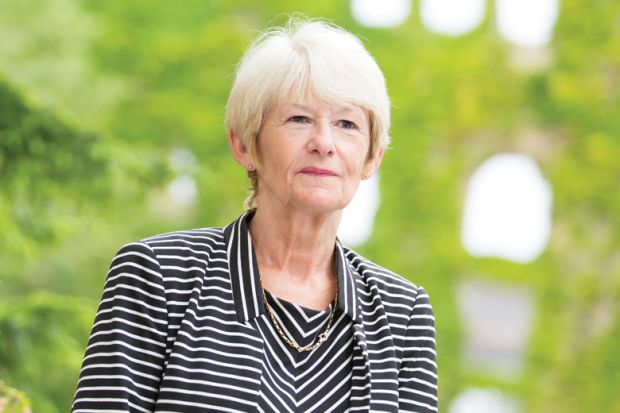Dame Nancy Rothwell is president and vice-chancellor of the University of Manchester. A noted neuroscientist, she has led the UK’s largest single-site university since 2010 and was the first woman to lead the institution. She has been named one of the top 20 most powerful women in the UK by BBC Radio 4’s Woman’s Hour. In June, she was announced as the next president of the British Science Association, a charity promoting wider engagement with science.
Where and when were you born?
1955, in a small village in Lancashire. I loved studying and working in London for 13 years, but the North feels like home.
How has this shaped you?
Much of my early childhood was spent outdoors. My father was a science lecturer, so the house was full of skeletons, specimens and scientific books. I got plenty of time to read them as I contracted tuberculosis when I was nine and was off school for nearly two years.
What do you hope to achieve during your British Science Association presidency?
Promoting the BSA, of course. I’d like to develop a statement for universities to sign up to stating that they will “encourage, support and reward public engagement”.
The potential disruption to scientific research as a result of Brexit has been one of the dominant stories over the past few months. Will this add another dimension to your presidency?
It already has done. I’ve spent quite a lot of time reassuring staff and students that as yet nothing has changed. The most important factors are mobility for staff and students and for the UK to be able to fully participate in European research partnerships.
Encouraging women to pursue scientific careers is also a key focus for you. Where do you think the UK stands globally on this?
OK, but we could do better. Those countries that are well ahead of us tend to have positive discrimination or “quotas”. I’m not keen on either, but targets can help.
When and where do the barriers occur?
We know that fewer girls study science and engineering at university, but there is also a higher dropout rate in early career stages.
You’re the v-c of one of the largest and most well-known institutions in the country. Do you ever feel that you would like to return to everyday academic life rather than have the pressures of being a university head?
Given the enormous challenges and uncertainties of leading a university, the honest answer is “sometimes”, but I still do research, publish papers and teach a few first-year lectures.
Your list of academic achievements is considerable, and each must have its own level of significance. Which one brings you the most pride and joy?
Discovering that blocking a protein in the brain called interleukin-1 can reduce the damage caused by a stroke or brain injury. We hope to start the final phase of clinical trials next year. Election to the Royal Society was also a great recognition from my peers.
If you weren’t an academic, what do you think you’d be doing?
I nearly studied art (I did maths, physics, chemistry and art at A level), but realised that I wasn’t good enough to make a career of it. My dream job would be a racing car driver.
What has changed most in global higher education in the past 10 years?
Expectations: of students, of universities and of research. Not all bad, but a lot more pressure.
What advice would you give to your younger self?
Be bolder.
What are the best and worst things about your job?
The best? Degree ceremonies and seeing students and parents celebrating, and attending the Nobel prize ceremony in Stockholm for two of our staff. The worst? Having to make decisions that I really believe are the right thing for the university but that many will not see that way.
What keeps you awake at night?
Jet lag.
What do you do for fun?
Spend time at our house in the countryside in Sweden, where the summers are hot and sunny and the winters cold and snowy.
What’s your biggest regret?
I don’t have many regrets, but I wish that I’d taken a few more risks in my career.
What advice would you give to your students?
Think “outside the box”, or as one of my colleagues, Sir Andre Geim [the Nobel prizewinning physicist], said: “If you follow the trodden path, you may find that all the grass has been eaten.”
What kind of undergraduate were you?
A very sociable one. I worked in the student bar four nights a week. But in the final year I got the “research bug” and then worked incredibly hard – almost too late.
What’s your most memorable moment at university?
Winning the three-legged pancake race, which went through various ponds and was very challenging.
What is the biggest misconception about your field?
As with most science fields, that the prevailing view is right. I changed field mid-career and the best thing about this was that I had no preconceptions or “precious views” about a new field.
What project would you undertake if money were no issue?
To analyse the value of fundamental research to society.
If you were the higher education minister for a day, what policy would you introduce?
Abolish all league tables.
What is your vision of an ideal higher education world?
That the UK higher education system maintains (and even strengthens) its position as a world leader in higher education and research; that it welcomes students and staff from across the world, and has a recognised benefit to society.
Appointments
Michelle O’Malley has been appointed deputy director of the Warburg Institute, part of the University of London’s School of Advanced Study. Professor O’Malley, a Renaissance Italian art scholar, joins the institute on 1 October. She has just completed a year-long research fellowship at the National Humanities Center in North Carolina. Professor O’Malley has long-standing links with the Warburg, having completed her PhD there in 1994. “The Warburg Institute was my first intellectual home and I am personally committed to its future success,” she said. “I am delighted to be joining the institute to work with the director and the staff to develop and manage, and also to contribute to, its academic programme and to represent the Warburg in the wider national and international academic community.”
David Petley has been appointed pro vice-chancellor for research and innovation by the University of Sheffield. Professor Petley joins Sheffield from the University of East Anglia where he holds a similar position. He will lead Sheffield’s commitment to internationally excellent research and innovation across the faculties of science, engineering, medicine, social sciences and the arts and humanities, and will help promote and support the university’s research institutes and centres. He said: “I am keenly aware that the university has a powerful reputation for the translation of its research and partnership with large global and smaller local companies, which is central to the strategy of the city region, its economy and the aspirations of local people.”
Mike Kagioglou, dean of the University of Huddersfield’s School of Art, Design and Architecture, has been appointed vice-chair of the Chartered Institute of Building’s innovation and research panel and a board member of the International Council for Research and Innovation in Building and Construction.
Evelyn Telfer of the University of Edinburgh won an award for the best oral presentation of a basic science topic at the European Society for Human Reproduction and Embryology meeting in Helsinki. Professor Telfer was presenting her research into the impact of chemotherapy on female fertility.
POSTSCRIPT:
Print headline: HE & me
Register to continue
Why register?
- Registration is free and only takes a moment
- Once registered, you can read 3 articles a month
- Sign up for our newsletter
Subscribe
Or subscribe for unlimited access to:
- Unlimited access to news, views, insights & reviews
- Digital editions
- Digital access to THE’s university and college rankings analysis
Already registered or a current subscriber? Login









